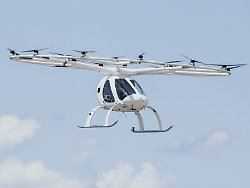Saturday, September 25, 2021
Air taxi hype
When do we take off with mini jets?
Autonomous flying taxis are the next big thing. Research has been going on for years – also in Germany. But when exactly will this dream of remote-controlled flying become a reality? The Bruchsal company Volocopter is following an ambitious schedule.
The Bruchsal air taxi startup Volocopter speaks of the “Dorothee Bär moment”: The moment a few months after the last federal election in 2017 when CSU politician Bär spoke shortly after her appointment as Minister of State for Digitization in March 2018 that in the future, possibly Air taxis can fly from A to B.
She earned a lot of malice for the sentence. However, the idea of autonomously flying aircraft that could relieve traffic has long been a concern of many companies and at the time unexpectedly catapulted the topic into the public eye. Now the next federal election is coming up – how far have the utopias come from back then?
“There are already many technically well-engineered prototypes, but there are still no ‘reality checks'”, says Michael Decker from the Institute for Technology Assessment and Systems Analysis (ITAS) in Karlsruhe. Because many questions are unanswered: “For example, where are they supposed to take off and land, what about the already very strict German guidelines for noise during the day or at night.” Another big question is whether the aircraft have a pilot on board or not: “If the device flies completely autonomously, then a few questions of acceptance come into play,” he says. It may feel good on a sunny and windless day, but in a thunderstorm or a storm, one or the other can quickly become uncomfortable. “
The fear of autonomous flying
In fact, there is still a lack of acceptance, as researchers from the Stuttgart Fraunhofer Institute for Industrial Engineering (IAO) found out in a user survey in Germany, the USA and South Korea. In Germany, almost 40 percent of those surveyed would not board an autonomous air taxi, a good 28 percent would at least find it rather unlikely. Instead, fear and fear prevailed across all age groups. The conclusion of the study published in February of this year: Autonomous air taxis for the transport of people in cities are “still more of a hype topic”.
“We know the critical acceptance studies,” replies Florian Reuter, Managing Director of Volocopter – and opposes them. A study by the Stuttgart University of Applied Sciences in 2019 shows that acceptance is far higher as soon as respondents themselves have had the opportunity to see an air taxi flying. In December 2019, a Volocopter air taxi flew in front of an audience in a European city for the first time in Stuttgart. Afterwards, around 1200 of the approximately 12,000 spectators were surveyed – 67 percent said they said they would use an air taxi as likely to very likely.
Volocopter plans to start trial operations in 2023
The Bruchsal company has been dealing with air taxis for more than ten years. “We are the pioneers in this field, nobody can fool us so quickly,” says Reuter. Volocopter wants to offer commercial connections in time for the 2024 Olympic Games in Paris – if the authorities there play along. “Some national confirmations are still needed.” Volocopter wants to clear the last hurdle by the end of 2023, after which it will go into trial operation – “then we want to be able to fly to some Olympic locations from the airport”.
However, Reuter wants to take concerns about autonomous taxis seriously. “We fly with a pilot first, so you have to break the ice first,” he says. The authorities who have to regulate the airspace also felt more comfortable when a pilot was on board, “because the legal framework for fully autonomous operation does not yet exist”.
Air taxi projects around the world are numerous, experts’ estimates vary between 100 and 120. Many companies are involved in this segment – such as Airbus, Daimler or Volkswagen.
Insufficient airspace management
The Bavarian startup Lilium also wants to go into series production with its electric aircraft in a few years and has just made its debut on the US stock exchange. However, according to Decker, there are still many crucial prerequisites for commercial flights: Neither there are enough take-off and landing sites nor an effective airspace management system that could someday in the future navigate thousands or even tens of thousands of air taxis over cities. Projects at European level such as SESAR (Single European Sky ATM Research) have been researching this for years.
A completely different question is that of costs. In the long run, the flight with an air taxi will be comparable to the price of a taxi ride, says Reuter. However, this also requires sufficient passengers – and when the time comes is written in the stars. Because Decker from the Institute for Technology Assessment and Systems Analysis (ITAS) in Karlsruhe would not get into an autonomous flying taxi at the moment: “There are still too many imponderables for that.”
